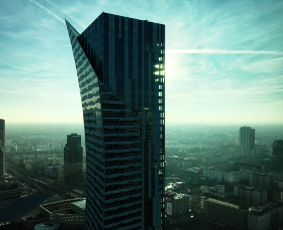Apparently, conservatives are losing their faith, and they’re losing it fast.
No, it’s not about imaginary friends for a change, it’s about the “neoliberal economy.” Frank Schirrmacher’s FAZ article »›Ich beginne zu glauben, dass die Linke recht hat‹« needs two pairs of quotation marks because it is based on another conservative journalist’s recent article, Charles Moore’s “I’m Starting to Think That the Left Might Actually Be Right,” in The Telegraph.
All this shouldn’t come as a surprise. Milton Friedman died in 2006, right before this sustained and ongoing barrage of crises hit the European and U.S. economies. Even though I personally think that either Friedman’s theories, or his priorities, or both were terribly wrong, I’d really like to hear his opinions on this mess. I don’t think Friedman ever associated economic liberalism and free markets with the kind of global predators that infest our economic waters who, deliberately and completely unrestrained, rob us blind, kill our future, and devastate our planet. The kindest explanation I can think of is that it was a failure of the imagination on his part.
Rational Expectations, Efficient Markets? Pipe dreams we should wake up from—to the reality of a post-capitalist economy where the real money has become virtual long since, popping out of nothing like virtual particles but without paying back its dues on its borrowed buying power. Instead, it’s you and me who pay its dues, with our taxes, our money, our purchasing power, our social institutions, our freedoms, our quality of life, our future, and our planet.
If we don’t wake up from these pipe dreams and radically overhaul our financial and political structures—which, for all practical purposes, have truly become the same—and don’t do so real soon, we can all kiss our collective ass goodbye.
Concerning Comments
While I disabled comments ages ago, I preserved legacy comments. However, as each page with active comments throws a critical error for inexplicable reasons—even with all plugins deactivated—I attached all legacy comments as images with ALT texts instead.
If you have something valuable to add or some interesting point to discuss, I’ll be looking forward to meeting you at Mastodon!

![Siggi Becker [ Google+ ]
August 14, 2011 • 15:16
Vorsicht in der Verteidigung Friedmans gegen sich selbst. Check the role of Friedman in Pinochet’s Chile. He had time and opportunity to see what he had done. And I must add: He did approve this wreckage.
gyokusai
August 14, 2011 • 15:24
In a universe where his axioms held true, Friedman would be brilliantly right. I think he just took a wrong turn off the Multiverse Freeway, and never noticed.
Siggi Becker [ Google+
August 14, 2011 • 15:35
And: He met Pinochet and patted his back. “The wonder of Chile.”
gyokusai
August 14, 2011 • 15:52
Everybody did back then (except “the communists”).
Siggi Becker [ Google+
August 14, 2011 • 19:35
http://en.wikipedia.org/wiki/Miracle_of_Chile
http://en.wikipedia.org/wiki/Chicago_Boys
gyokusai
August 14, 2011 • 20:33
“Friedman has wondered why some have attacked him for giving a lecture in Chile: ‘I must say, it’s such a wonderful example of a double standard, because I had spent time in Yugoslavia, which was a communist country. I later gave a series of lectures in China. When I came back from communist China, I wrote a letter to the Stanford Daily newspaper in which I said, “It’s curious. I gave exactly the same lectures in China that I gave in Chile. I have had many demonstrations against me for what I said in Chile. Nobody has made any objections to what I said in China. How come?”’ He points out that his visit was unrelated to the political side of the regime and that during his visit to Chile he even stated that following his economic liberalization advice would help bring political freedom and the downfall of the regime.”
Siggi Becker [ Google+
August 14, 2011 • 20:53
Thats definitely a marginal point if you want to see the role of Friedman in neo-liberalism. The point is that Friedman had 2 full blown experiments (Chile and UK) which followed actively his theories either through his active consultation or his students (Chicago Boys). The rest is history. Read Rothkopf to see how deep Friedman up to today is ingrained into the Chilean economic theory with the result of an GINI-index as of 2009 of 52.
gyokusai
August 14, 2011 • 21:47
Yes but the “Chicago Boys” aren’t Friedman incarnate, or vice versa, and of course it wouldn’t and couldn’t work in the long run, or be compatible with social justice and humanism in general—as I said: “Even though I personally think that either Friedman’s theories, or his priorities, or both were terribly wrong.” All I want to argue is, what neolibs in politics have not be doing themselves but opened our doors for, isn’t what Friedman had in mind. And, however cynically that might sound, Chile’s GINI index notwithstanding its economy still ranks among the “best and most stable” in South America. Now, according to Friedman’s theories, economic inequality is exactly what makes life better for all of us in the long run—a perspective he developed most fascinatingly from, among other things, his own immigrant family’s experience of poverty and exploitation of labor. Again, I think he’s terribly wrong. But not wrong in the way most people think he is. And it should be obvious to him that, while inequality thrives and blossoms, life’s totally not getting better for all of us in the long run.](https://betweendrafts.com/wp-content/uploads/2011/08/comments-2011-08-14.jpg)
